Commemorating the COVID-19 Pandemic
Honouring the lives lost and paying tribute to the sacrifices made and acts of public service during the COVID-19 pandemic.
This page describes the government’s COVID-19 Commemorative programme. To explore different ways you can commemorate COVID-19, visit COVID-19 Commemoration: ways to remember. To find COVID-19 help and support organisations, visit COVID-19 Commemoration programme: help and support.

The COVID-19 Commemorative programme honours the lives lost and pays tribute to the sacrifices made by so many. It reflects on the extraordinary acts of service, courage and kindness demonstrated right across the UK during this difficult time.
The COVID-19 Commemoration Programme
The UK Commission on Covid Commemoration was established to consult on how we can commemorate the lives lost in the COVID-19 pandemic, recognise the sacrifices made by so many in support of our public services and mark this distinctive period in our history at a national and community level.
The UK government is delivering a programme of commemorative activity to mark the COVID-19 pandemic. The COVID-19 Commemorative programme will:
-
continue to support the UK-wide COVID-19 Day of Reflection taking place in March every year as a moment to come together to remember the lives lost and the sacrifices made
-
launch a new UK-wide fellowship scheme on natural hazards to support future national resilience
-
work alongside the Friends of the Wall and local partners to support the long term preservation of the National Covid Memorial Wall as a national memorial to the lives lost to COVID-19
-
recognise the importance of the existing community COVID-19 memorials and seek opportunities to support additional memorial activity that will reflect the importance of green spaces to the nation throughout the pandemic
-
publish COVID-19 commemoration information online to provide an accessible repository of commemorative activity, including Day of Reflection, oral histories that tell the stories and experiences of the pandemic, education materials and information about COVID-19 memorials across the country, making it easier for the public to visit them.
COVID-19 Day of Reflection
COVID-19 Day of Reflection event held in Belfast, 9 March 2025
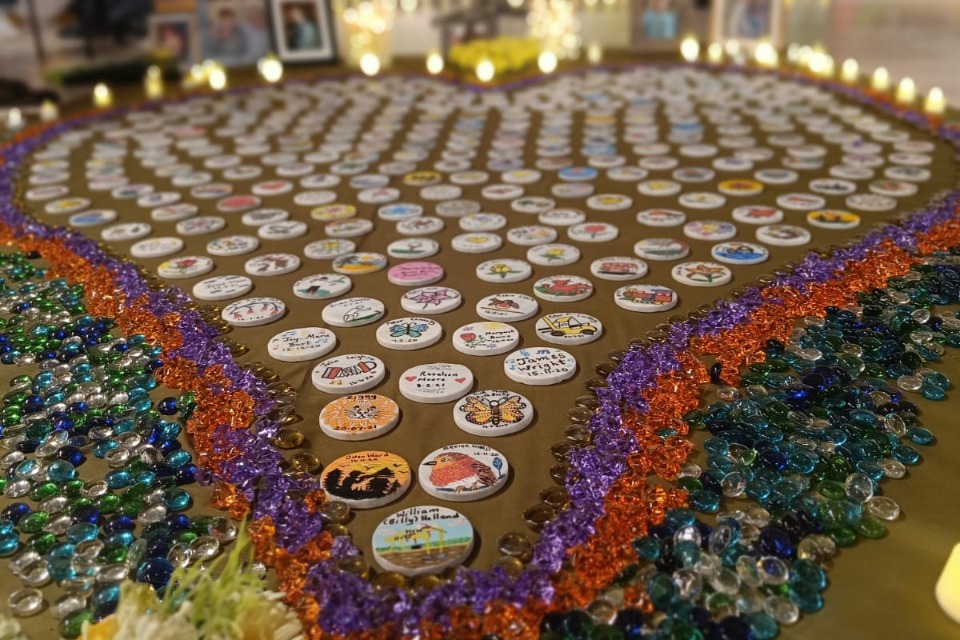
Photo by: Ciaran Ward
Over 300 stones were painted with the name of a special person who passed away during the pandemic to remember loved ones from across the world. The stones are displayed by the Memory Stones of Love in the shape of a heart at their annual COVID-19 Day of Reflection event in Belfast.
A COVID-19 Day of Reflection has been held each year since 2021.
The UK government is committed to supporting the COVID-19 Day of Reflection. The Day offers communities across the country the opportunity to join together to commemorate those who lost their lives and for everyone impacted by the pandemic.
The Day of Reflection 2025 marked the fifth anniversary of the pandemic and saw over 200 events taking place across the country, with a further 160 spaces for reflection. A range of organisations, from groups of bereaved families to local authorities to charities and other community groups, organised events and activities to help others reflect on the losses of the pandemic.
This year’s COVID-19 Day of Reflection takes place on Sunday 8 March 2026. The dates for the following years are:
- Sunday 14 March 2027
- Sunday 12 March 2028
Visit COVID-19 Day of Reflection for more details of the day. Hear more about why groups and individuals mark the day in the Behind the Hearts video series.
COVID-19 memorials
The UK Commission on Covid Commemoration set out the importance of remembering and reflecting on the impact of the pandemic. Memorials can provide significant value in unifying communities and providing a lasting monument to, or space to reflect on, the COVID-19 pandemic.
Since the publication of the report of the UK Commission on Covid Commemoration, significant activity has been undertaken in communities to memorialise the impact of the COVID-19 pandemic, including the creation of a number of COVID-19 memorials. These have been in the form of statues, tree planting initiatives, plinths, plaques and many more.
To recognise and highlight these existing memorials and enable the public to find the memorials closest to them, a COVID-19 memorials map and a list of COVID-19 memorials has been developed. This map and list may not currently include every COVID-19 related memorial. Memorials will continue to be added to the map and list.
COVID-19 Memorial Garden - Livingston, West Lothian
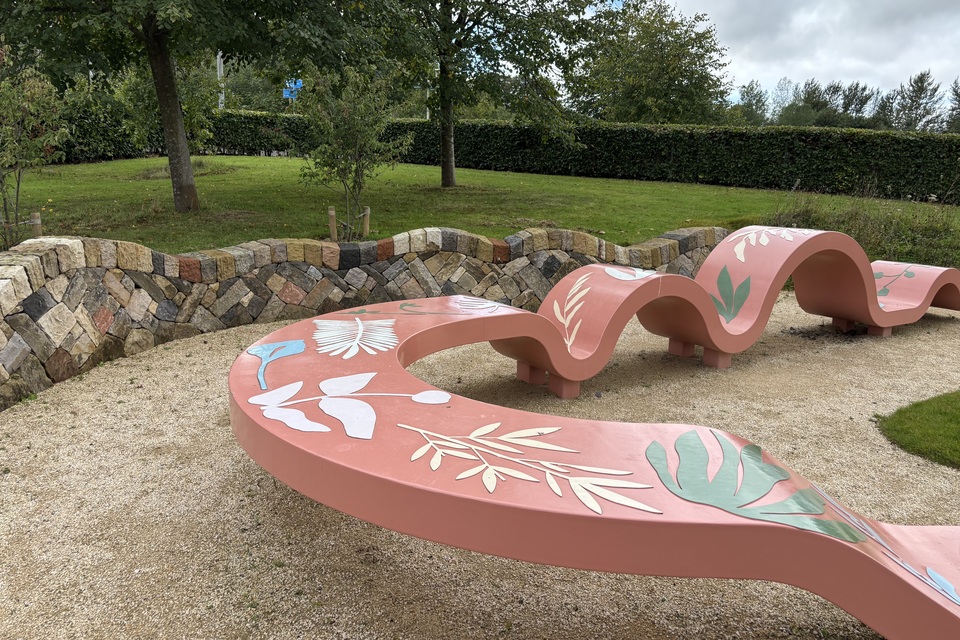
Photo by: West Lothian Council
A sculpture ‘The Ribbon’ featuring artistic renderings of plants and flowers, alongside memories of loved ones built into a ‘Wave Wall’, have been installed in a memorial garden in Almondvale Park, to remember lives lost during the pandemic.
COVID-19 Memorial Wood - Maidstone, Kent
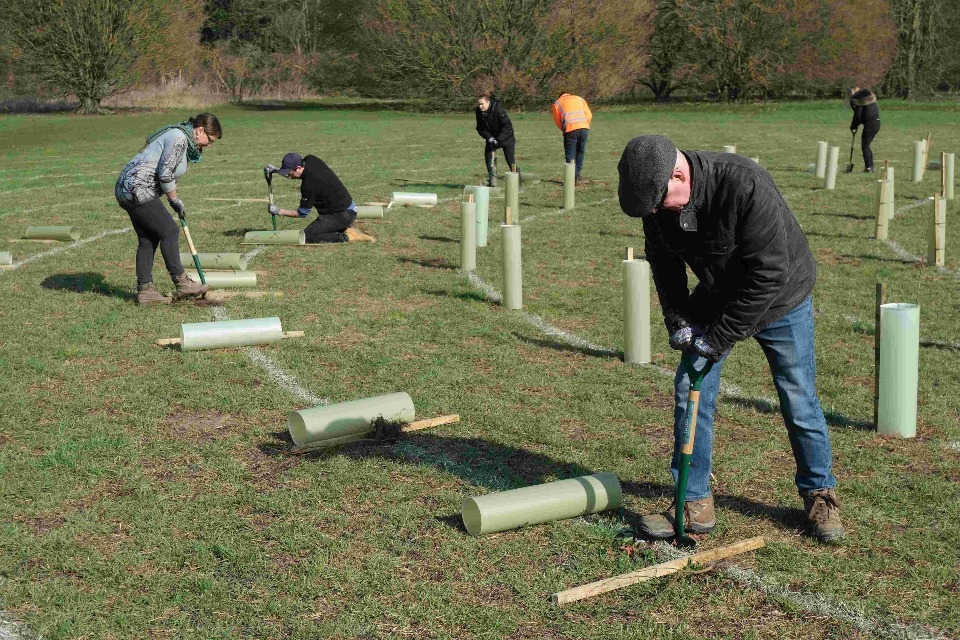
Photo by: Maidstone Borough Council
A memorial woodland in Allington Open Space made up of 633 oak, birch, hawthorn and field maple trees planted in circles to create a sense of endless remembrance and respect to commemorate those who died and anyone impacted as a result of COVID-19.
Memorial Corner - Dorchester, Dorset
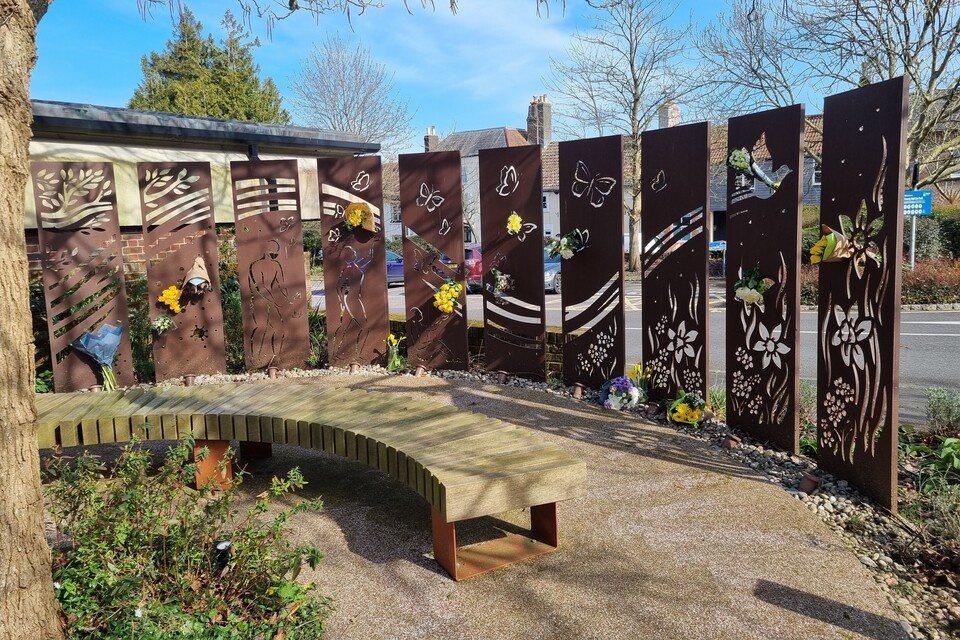
Photo by: Judy Saunders, Dorset Council
A renovated memorial space at County Hall in Dorchester featuring 11 new panels, paved seating areas and planters, in memory of frontline workers who lost their lives to COVID-19.
Reverence, Barnsley
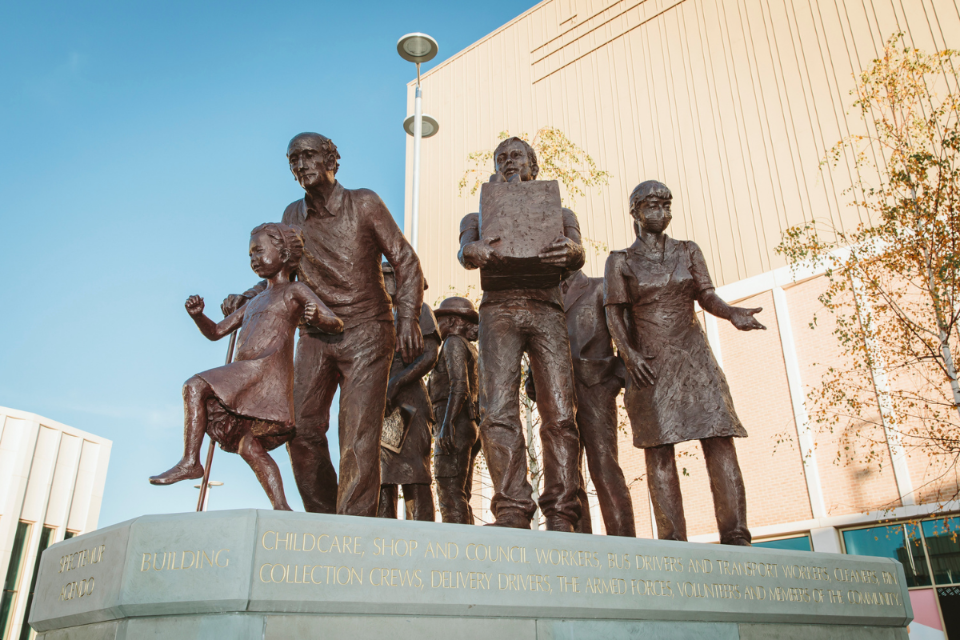
Photo by: Barnsley Metropolitan Borough Council
A memorial sculpture installed at the heart of Barnsley’s town centre to mark the impact of the COVID-19 pandemic, to honour the lives lost and to pay tribute to key workers and volunteers.
Willow Tree Memorial, Sheffield
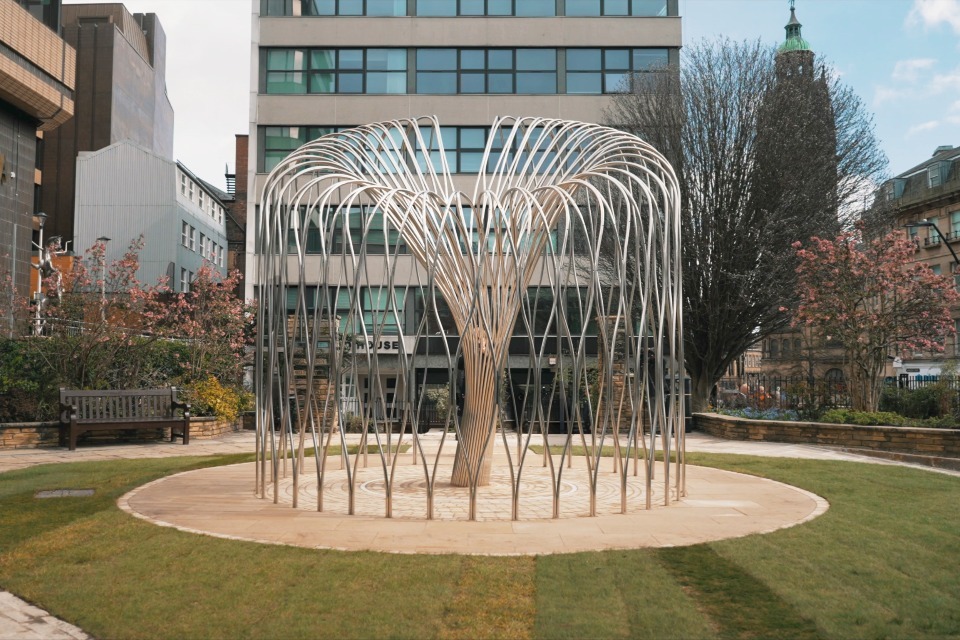
Photo by: Opus
A stainless steel willow inspired sculpture, honouring those affected by COVID-19 and providing a reflective space for community remembrance, installed in Balm Green Gardens in Sheffield city centre.
Yellow Heart Memorial - Treorchy, Rhondda Cynon Taf
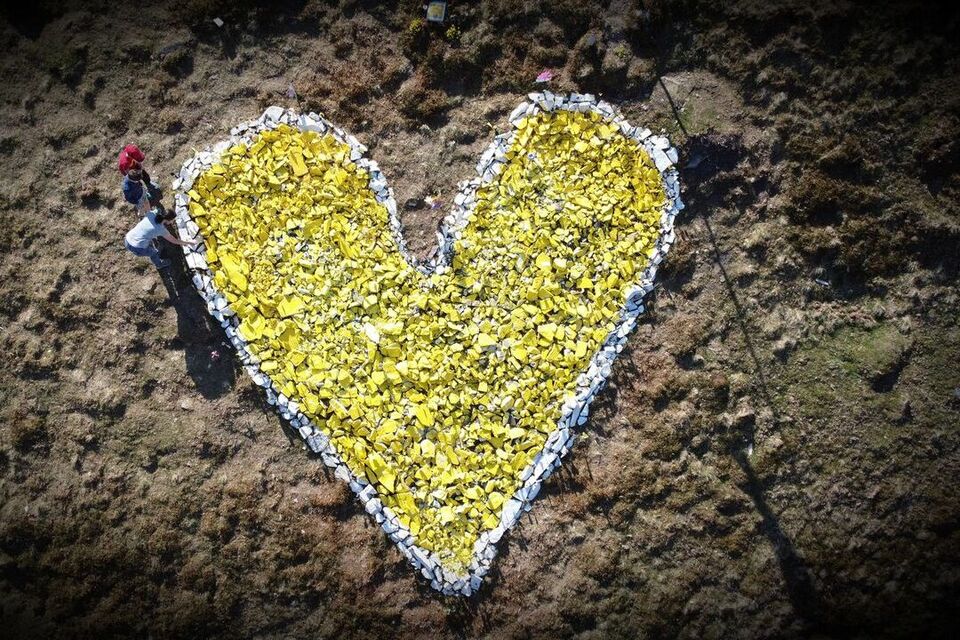
Photo by: Bev Johnson
In Treorchy, South Wales, for the COVID-19 Day of Reflection in 2025, families and friends bereaved by COVID-19 came together to honour and remember their loved ones at a moving gathering. One by one, they placed named flags at the yellow heart memorial on Bwlch Mountain - a symbol of love, loss, and remembrance. The memorial was created in 2021 by Bev Johnson, who built the giant, yellow stone heart on the steep slope in memory of her mother, lost to COVID-19. A place where she and others could come to grieve and reflect together. Covid-19 Bereaved Families for Justice Cymru were privileged to be able to support the recreation of the memorial and reflective community event.
The National Covid Memorial Wall
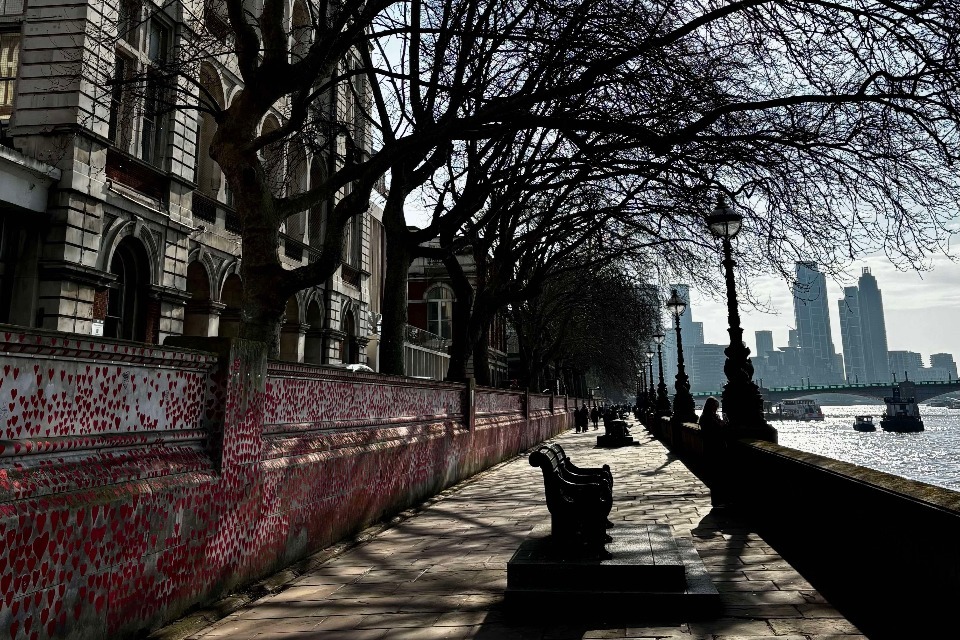
Photo by: Anne Grange
Founded in 2021, the National Covid Memorial Wall stretches 500 metres alongside the River Thames opposite the Houses of Parliament, and includes approximately 250,000 hand-painted red hearts. The Wall marks the scale of loss to COVID-19 in the UK, with each heart representing a person who died of COVID-19 as a direct cause of death.
The Wall is a unique memorial, created by the bereaved for the bereaved. The memorial is maintained by a group of volunteers all bereaved by COVID-19, The Friends of the Wall, who in 2025 established a charity, The National Covid Memorial Wall CIO, with the purpose of maintaining and preserving the memorial. They also organise a number of events across the year to remember all who lost their lives to COVID-19.
The government recognises the significance of the Wall and its role in providing a space for reflection, remembrance and grieving. We recognise the ‘Friends of the Wall’ team for their tireless efforts and dedication to create and maintain this important memorial. The UK government is working closely with the Friends of the Wall and all local partners on the preservation of the Wall.
More information on the history of the Wall is available at National Covid Memorial Wall.
Partnerships creating new COVID-19 commemorative spaces
The UK Commission’s report highlighted the importance of green spaces during the pandemic as the nation sought to spend time in nature during lockdown. In recognition of this, the government is working with Forestry England on the creation of new COVID-19 commemorative spaces across England’s forests.
In addition, we are pleased to announce that we are partnering with NHS Charities Together on a scheme to create new COVID-19 commemorative green spaces that will be available as community spaces of reflection across the UK.
More information on these reflective spaces will be available soon.
Stories of the COVID-19 pandemic
Everyone has a unique story to tell about the COVID-19 pandemic. Many personal commentaries of historical significance have been collected in different forms, including recorded interviews, video and documented records.
The UK Commission on Covid Commemoration in particular highlighted how the recording of oral histories is a compelling and engaging way of sharing the diverse range of experiences observed at the height of the pandemic.
The government acknowledges the importance of oral history collections as powerful and poignant resources for capturing the wide range of experiences and perspectives on the COVID-19 pandemic.
The UK Commission on Covid Commemoration also recommended providing links to an online book of remembrance for those who died during the pandemic, and to COVID-19 related collections in museums and other institutions including collections of oral histories from a wide range of groups including bereaved families, frontline workers, volunteers, the scientific community and young people.
St Paul’s Remember Me is an online memorial to those who died as a result of the COVID-19 pandemic. It is free to leave a tribute to a loved one, and the memorial is open to people of all faiths and none.
Visit COVID-19 Commemoration: ways to remember for a list of stories of the COVID-19 pandemic from third-party organisations. The list will be updated as new collections are submitted.